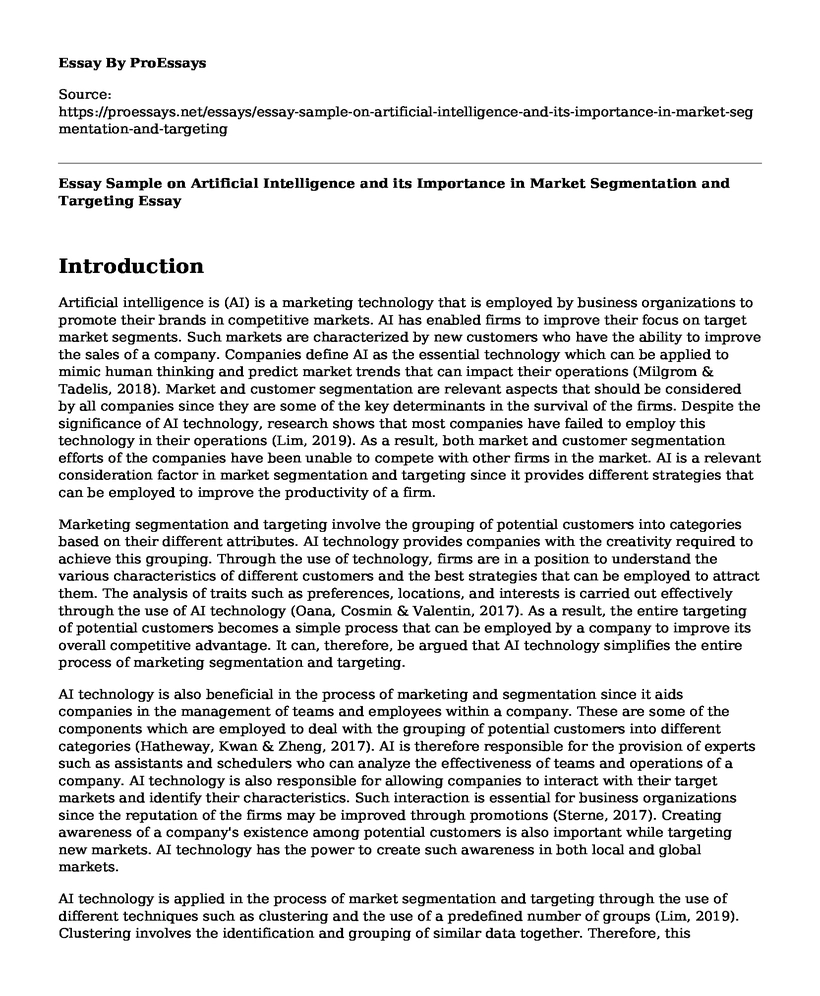Introduction
Artificial intelligence is (AI) is a marketing technology that is employed by business organizations to promote their brands in competitive markets. AI has enabled firms to improve their focus on target market segments. Such markets are characterized by new customers who have the ability to improve the sales of a company. Companies define AI as the essential technology which can be applied to mimic human thinking and predict market trends that can impact their operations (Milgrom & Tadelis, 2018). Market and customer segmentation are relevant aspects that should be considered by all companies since they are some of the key determinants in the survival of the firms. Despite the significance of AI technology, research shows that most companies have failed to employ this technology in their operations (Lim, 2019). As a result, both market and customer segmentation efforts of the companies have been unable to compete with other firms in the market. AI is a relevant consideration factor in market segmentation and targeting since it provides different strategies that can be employed to improve the productivity of a firm.
Marketing segmentation and targeting involve the grouping of potential customers into categories based on their different attributes. AI technology provides companies with the creativity required to achieve this grouping. Through the use of technology, firms are in a position to understand the various characteristics of different customers and the best strategies that can be employed to attract them. The analysis of traits such as preferences, locations, and interests is carried out effectively through the use of AI technology (Oana, Cosmin & Valentin, 2017). As a result, the entire targeting of potential customers becomes a simple process that can be employed by a company to improve its overall competitive advantage. It can, therefore, be argued that AI technology simplifies the entire process of marketing segmentation and targeting.
AI technology is also beneficial in the process of marketing and segmentation since it aids companies in the management of teams and employees within a company. These are some of the components which are employed to deal with the grouping of potential customers into different categories (Hatheway, Kwan & Zheng, 2017). AI is therefore responsible for the provision of experts such as assistants and schedulers who can analyze the effectiveness of teams and operations of a company. AI technology is also responsible for allowing companies to interact with their target markets and identify their characteristics. Such interaction is essential for business organizations since the reputation of the firms may be improved through promotions (Sterne, 2017). Creating awareness of a company's existence among potential customers is also important while targeting new markets. AI technology has the power to create such awareness in both local and global markets.
AI technology is applied in the process of market segmentation and targeting through the use of different techniques such as clustering and the use of a predefined number of groups (Lim, 2019). Clustering involves the identification and grouping of similar data together. Therefore, this technique is employed to identify customers who have similar characteristics and group them in the same category. A predefined number of groups is used to identify the total number of groups involved in the target market (Lim, 2019). After the identification, it becomes possible to understand the required preparation and capital that must be employed to attract potential customers. From this discussion, it is clear that Artificial Technology is a technology that is essential in the overall process of market segmentation and targeting practices of different companies. The technology makes it possible for firms to group customers in the target market and employ the necessary strategies that contribute to their success.
References
Hatheway, F., Kwan, A., & Zheng, H. (2017). An empirical analysis of market segmentation on US equity markets. Journal of Financial and Quantitative Analysis, 52(6), 2399-2427.
Lim, T. (2019). The Most Important Data Science Tool for Market and Customer Segmentation. Retrieved from https://towardsdatascience.com/the-most-important-data-science-tool-for-market-and-customer-segmentation-c9709ca0b64a
Milgrom, P. R., & Tadelis, S. (2018). How artificial intelligence and machine learning can impact market design (No. w24282). National Bureau of Economic Research.
Oana, O., Cosmin, T., & Valentin, N. C. (2017). Artificial Intelligence-A New Field of Computer Science Which Any Business Should Consider. Ovidius University Annals, Economic Sciences Series, 17(1), 356-360.
Sterne, J. (2017). Artificial intelligence for marketing: practical applications. John Wiley & Sons.
Cite this page
Essay Sample on Artificial Intelligence and its Importance in Market Segmentation and Targeting. (2022, Dec 02). Retrieved from https://proessays.net/essays/essay-sample-on-artificial-intelligence-and-its-importance-in-market-segmentation-and-targeting
If you are the original author of this essay and no longer wish to have it published on the ProEssays website, please click below to request its removal:
- Dangerous Consumption: Is the Consumer or the Company to Blame?
- Management of Organizational Behavior Essay Example
- Publix Super Markets Case Analysis
- Innovation From an Organizational Viewpoint Dissertation Chapter Example
- Essay Sample on Human Resource Information System
- Essay on Energy Consumption and Economic Growth in Brazil: A Decade of Increase
- Essay Example on Product Manager's Guide to Measuring Super Bowl Ad Effectiveness







